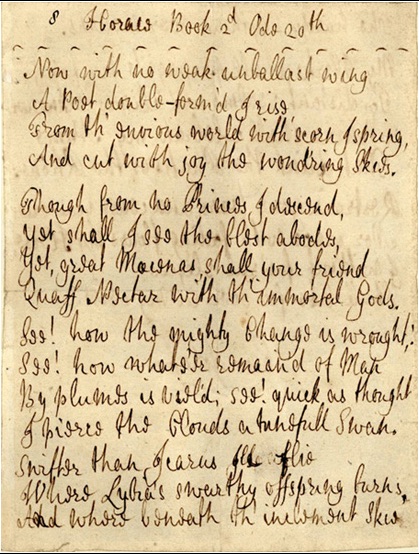Translation of Horace, Ode ii.20
Johnson was probably in his mid-teens when he translated this ode of the Roman poet Horace as a school exercise. In itself, this was not a sign of Johnson’s being particularly precocious; all students in English schools in this era would have been required to translate Latin poetry, and Horace was a particularly popular writer in the curriculum. Still, this is an interesting poem, not only for how Johnson brings his Horatian original into English, but because of its theme: the desire for literary fame. Even at a young age, Johnson was ambitious. Johnson would continue to admire Horace’s Odes and would translate them into English verse from time to time for the rest of his life.
Johnson saved the manuscript of the poem, which may be a sign that he was fond of his translation. But the poem was not published in any form until 1941. The original manuscript is now in the Hyde Collection of Johnsoniana at Harvard University.

Horace, Odes Book II.XX (Johnson)
Now with no weak unballast wing
A poet double-form’d I rise,
From th’envious world with scorn I spring,
And cut with joy the wondering skies.
Though from no princes I descend,
Yet shall I see the blest abodes,
Yet, great Maecenas shall your friend
Quaff nectar with th’immortal Gods.
See! how the mighty change is wrought!
See how whatre remain’d of man
By plumes is veil’d; see! quick as thought
I pierce the clouds a tuneful swan.
Swifter than Icarus I’ll fly
Where Lybias swarthy offspring burns,
And where beneath th’inclement skis
The hardy Scythian ever mourns.
My works shall propagate my fame,
To distant realms and climes unknown,
Nations shall celebrate my name
That drink the Phasis or the Rhone.
Restrain your tears and cease your cries,
Nor grace with fading flours my hearse.
I without funeral elegies
Shall live forever in my verse.
Here is a modern translation of Horace’s poem
A poet of dual form, I won’t be carried
through the flowing air on weak or mundane wings,
nor will I linger down here on earth,
for any length of time: beyond envy,
I’ll leave the cities behind. It’s not I, born
of poor parents, it’s not I, who hear your voice,
beloved Maecenas, I who’ll die,
or be encircled by Stygian waters.
Even now the rough skin is settling around
my ankles, and now above them I’ve become
a snow-white swan, and soft feathers are
emerging over my arms and shoulders.
Soon, a melodious bird, and more famous
than Icarus, Daedalus’ son, I’ll visit
Bosphorus’ loud shores, Gaetulian
Syrtes, and the Hyperborean plains.
Colchis will know me, so will the Scythians,
who pretend to show no fear of Italian
troops, and the Geloni: Spain will learn
from me, the expert, and those who drink Rhone.
No dirges at my insubstantial funeral,
no elegies, and no unseemly grieving:
suppress all the clamour, not for me
the superfluous honour of a tomb.
And here (for the truly hardcore) is the original Latin by Horace
Non usitata nec tenui ferar
penna biformis per liquidum aethera
uates neque in terris morabor
longius inuidiaque maior
urbis relinquam. Non ego pauperum
sanguis parentum, non ego quem uocas,
dilecte Maecenas, obibo
nec Stygia cohibebor unda.
Iam iam residunt cruribus asperae
pelles et album mutor in alitem 10
superne nascunturque leues
per digitos umerosque plumae.
Iam Daedaleo ocior Icaro
uisam gementis litora Bosphori
Syrtisque Gaetulas canorus
ales Hyperboreosque campos.
Me Colchus et qui dissimulat metum
Marsae cohortis Dacus et ultimi
noscent Geloni, me peritus
discet Hiber Rhodanique potor.
Absint inani funere neniae
luctusque turpes et querimoniae;
conpesce clamorem ac sepulcri
mitte superuacuos honores.